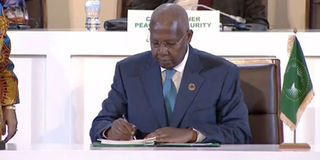Private sector fear for future as govt defends Africa trade area deal

Foreign Affairs minister Sam Kutesa signed on behalf Uganda during the conference in Kigali last week. FILE PHOTO
What you need to know:
- "... my worry is that this is not only an ambitious intention but it will also require massive and ambitious investment,” he said, adding that “for it to succeed it will require connectivity in terms of infrastructures such as roads, water transport, railways, highways and even standards,” Mr Gideon Badagawa, the Private Sector Foundation Uganda executive director
Kampala. Private sector players have expressed fear over the agreement establishing the African Continental Free Trade Area (AfCFTA) that was signed last week in Kigali, Rwanda by 44 African countries, among them Uganda.
Different private sector players that Daily Monitor spoke to expressed skepticism and worry, wondering how government will protect Uganda from becoming a dumping site.
A Cabinet paper, a copy of which Daily Monitor has seen, indicates, among other things, the agreement establishing AfCFTA seeks to boost intra-African trade that currently stands at about 14 per cent.
Presenting the government position on AfCFTA in Kampala yesterday, the minister of Trade, Ms Amelia Kyambadde, said: “With the integration of the African continent, Uganda stands to benefit from expanded trade, increased production capacity and creation of employment.”
“We are immediately targeting livestock products notably dairy and beef, coffee, tea, iron and steel. [while in the services sector we shall target] education, tourism, business services and infrastructure services,” she added.
The key markets that local manufacturers and other industry players can tap in, according to Ms Kyambadde is West Africa, particularly Nigeria, Ghana and Cameroon. In North Africa attention will be on Morocco, Algeria and Tunisia.
Ambitious plan
However, in an interview yesterday, Mr Gideon Badagawa, the Private Sector Foundation Uganda executive director, said the deal was not only ambitious, but its success and failure will demand more than just signing documents.
“Certainly there are huge benefits that will be achieved. But my worry is that this is not only an ambitious intention but it will also require massive and ambitious investment,” he said, adding that “for it to succeed it will require connectivity in terms of infrastructures such as roads, water transport, railways, highways and even standards. These are not things that can just be achieved by mere wishes. It will require strong political will and consensus.”
He said that without the infrastructure that will allow free movement of goods and services, the continental free trade will just remain that - a dream.
In another interview, the chairman of the Kampala City Traders Association, Mr Everest Kayondo, said Uganda and other EAC member countries risked becoming supermarket.
“I foresee a situation where we will be the market instead and not the other way round. We must first do the basics before entering into such ambitious projects,” he said.
Just like, Mr Badagawa, Mr Kayondo believes that local market must first be taken care of before thinking of regional, continental and even global market.
Uganda manufactures Association manager policy and advocacy, Mr Lawrence Michael Oketcho, when contacted yesterday said, there was need for a strategy that will give clear guidelines on how to go about this ambitious agreement.
“At the moment we are unsure of what the future holds until our pressing issues such high cost of power, exorbitant interest rate and high cost of production are addressed. We need some commitments from government otherwise let’s see how it unfolds,” he said.
Mr Africa Kiiza, the programme officer trade policies and negotiations at Seatini-U, said the events leading to the signing were more of a disappointment than the actual signing.
Seatini-U is a regional grouping that seeks to strengthen African trade across the globe.
“Three documents—the AfCFTA consolidated text, the Kigali Declaration and the Free Movement Protocol were up for signing as one package. However, some member states signed AfCFTA, others signed the declaration while some signed the Free Movement Protocol. This cherry picking already creates a wrong signal about the commitment of member states to promote unity beyond rhetoric,” he said.
According to Mr Kiiza, the AfCFTA will simply create a giant African market place with little of African products to trade in and will simply facilitate the movement of products imported from Europe and other areas across Africa.
According to a Cabinet information paper on the agreement, the executive wing of government recognises the fact that for this to be actualised there is need to massively invest in improving the interstate infrastructure and inter-connectivity.
What’s in it for the continent?
Currently, trade among African countries accounts for about 14 per cent of their total trade, a considerably lower figure than trade within many of the world’s more developed regions, including Europe and North America — both of which have intra-regional trade rates accounting for over 60 per cent.
The United Nations Economic Commission for Africa estimates that the AfCFTA could increase trade between African countries by as much as $35b, an increase of more than 50 per cent from current levels. This is corroborated by a study by the United Nations Conference on Trade and Development.
AfCFTA background
Uganda is a signatory to the treaty establishing the African Economic Community (the Abuja Treaty), adopted and signed in 1991. One of the major objectives of the treaty is to promote economic, social and cultural development and the integration of African economies in order to increase economic self-reliance. Last week Africa signed an agreement establishing the African Continental Free Trade Area. The signing took place on March 21 during the 10th Extraordinary Session of the Assembly of AfCFTA in Kigali, Rwanda.



